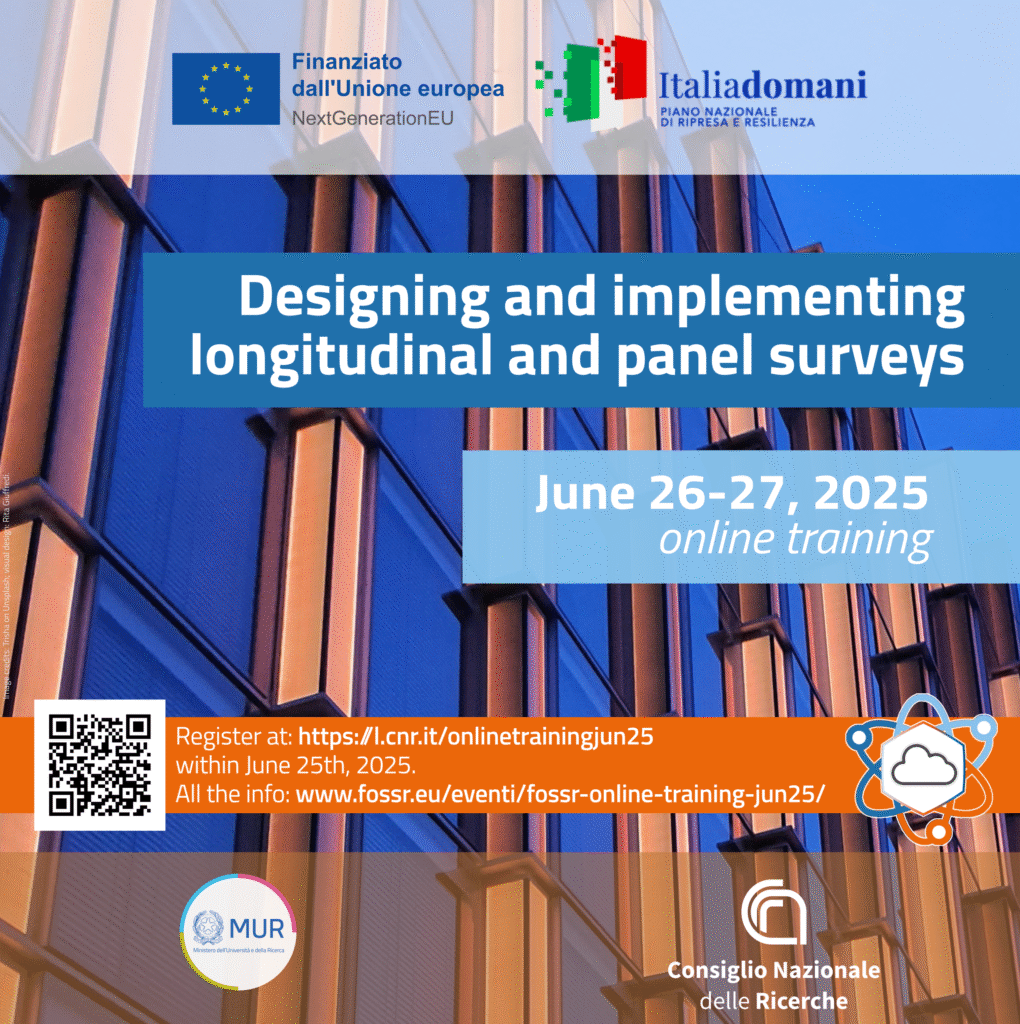 Longitudinal and panel data are essential for studying and tracking changes at both the individual and societal level, and they are widely applied across various disciplines in the social sciences, including sociology, psychology, economics, and health.
Longitudinal and panel data are essential for studying and tracking changes at both the individual and societal level, and they are widely applied across various disciplines in the social sciences, including sociology, psychology, economics, and health.
Gathering this type of data presents particular challenges that do not arise in cross-sectional studies.
This course is designed to offer both methodological and practical insights, presenting an overview of the elements of survey design, execution, and analysis that are specific to or uniquely characterized by the longitudinal framework, including the presentation of case histories related to four different surveys will be presented which currently are in their filed phase: the Italian Online Probability Panel, the European Social Survey (ESS), the Generations and Gender Survey, the GUIDE survey. The course will cover both methodological aspects and practical issues related to their implementation and management.
Aims and expected impact
The course aims to provide methodological, theoretical, and practical insights related to the design and implementation of longitudinal and panel surveys and their datasets, exploring differences and potential contexts of use. Moreover the course will give to the participants inputs on management, access and analysis of panel and longitudinal data. The theoretical and methodological elements will then be revisited through the analysis of four case studies: two longitudinal studies (the European Social Survey and the Generation and Gender Study) and two panel studies (Growing up in Digital Europe and the Italian Online Probability Panel).
By the end of the course, participants will:
- have a solid understanding of the key design principles behind longitudinal and panel studies,
- be knowledgeable about various approaches to gathering longitudinal data,
- be capable of crafting survey questions that align with research goals while reducing potential errors,
- grasp how to integrate new data sources with longitudinal survey data,
- be equipped to analyze and interpret issues related to non-response and dropout in longitudinal research,
- have a general comprehension of techniques used for weighting data and handling missing information in panel surveys,
- have knowledge of the specific ethical and privacy aspects related to the longitudinal dimension of panel data.
Agenda
June 26th
10 am – 1 pm: The design and implementation of a longitudinal survey research and a panel study – Methodological and theoretical aspects
Prof. Felice Addeo (Full Professor, Department of Political and Communication Sciences, University of Salerno)
During this course module, methodological aspects related to the implementation and management of longitudinal surveys and panel studies will be addressed. Specifically, the module will begin with an analysis of the distinctive features of longitudinal and panel studies, along with their respective risks and opportunities. It will then cover the main elements related to sampling and the strategies that can be adopted depending on the context and research objectives. A specific focus will be dedicated to web surveys, which are increasingly widespread, and to the design of survey questionnaires in contexts where either single-mode or mixed-mode data collection methods are used. The module will conclude with a short focus on the analysis of panel and longitudinal data.
2 pm – 5 pm: Results elaboration, data curacy and ethical issues in a longitudinal survey research and a panel study
Dott. Loredana Cerbara (CNR-IRPPS and FOSSR WP4 coordinator)
Giulia Ciancimino (PhD candidate University Roma 3, CNR-IRPPS)
The module, which maintains a methodological focus, will examine the specific characteristics of panel and longitudinal studies from a statistical perspective. Starting from the characteristics of a probabilistic panel and the identification of statistical units, the module will proceed to examine sampling procedures, taking into account different data sources. These types of studies also present specific features in terms of data processing and ethics, which will be addressed in detail, along with the various techniques of pseudonymization and anonymization. Moving on to the phase of data handling and preservation, the module will clarify aspects related to data storage, archiving, and data care, as well as the strengths and limitations associated with this type of data—namely longitudinality, cost-effectiveness, over-information, timeliness, and methodological risks.
June 27th
10 am – 2 pm: Case histories: the Italian Online Probability Panel (IOPP), the European Social Survey (ESS), the Generations and Gender survey (GGS), the Growing Up in Digital Europe survey (GUIDE)
Michele Santurro and Dario Germani (CNR-IRPPS)
Matilde Perrotti and Elena Marseglia (Bocconi University)
Francesco Piacentini (Milano Statale University)
Emilio Colella and Giovanni Righetto (Bologna University)
In the final module, four case studies will offer the opportunity to revisit the theoretical and methodological aspects covered in the previous modules through concrete examples that have been effectively implemented within their respective infrastructures. The case studies will be: the Italian Online Probability Panel, the European Social Survey (ESS), the Generation and Gender Survey, the Growing up in digital Europe survey.
Dettagli organizzativi
The course will be held online; the link will be provided to participants in due time before the beginning of the course.
Lessons will be held in Italian. Teaching materials, thematic literature and notes on the topics covered will be available to all participants in English.
The training is organised by CNR-IRPPS in the frame of the FOSSR project.
Local scientific/organising committee: Claudia Pennacchiotti, Loredana Cerbara (CNR-IRPPS).
*picture credits: Trisha on Unsplash




